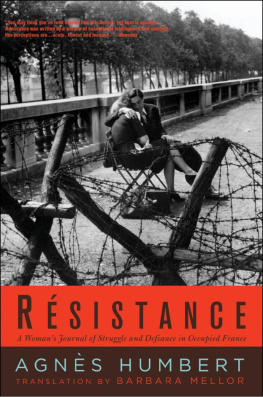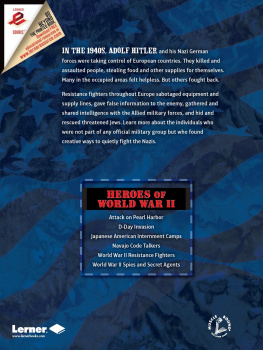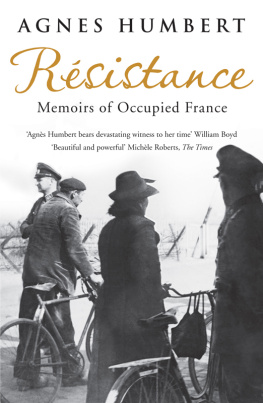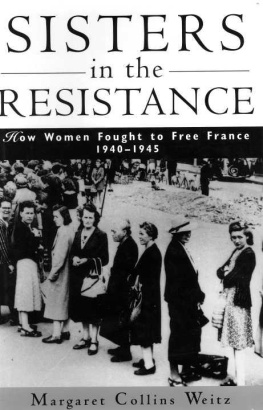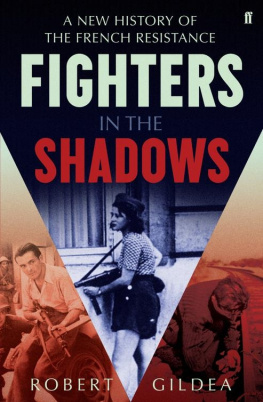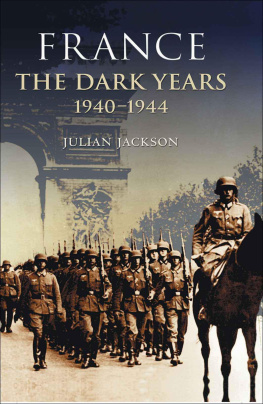BY THE SAME AUTHOR
Louis David: peintre et conventionnel
Die franzsische Malerei, von den Anfngen zum Impressionismus
Vu et entendu en Yougoslavie
Max Lingner (with Henri Barbusse)
Les Nabis et leur poque, 18881900
Gaston Diehl. Henri Matisse
La Sculpture contemporaine au Muse national d'art moderne de Paris
Bonnard, Vuillard et les Nabis (with Bernard Dorival)
Henri Matisse, dessins
Jean-Jacques Morvan
Maurice Denis (exhibition catalogue)
RSISTANCE
Memoirs of Occupied France
Agns Humbert
Translated from the French
and with notes by Barbara Mellor
Afterword by Julien Blanc

Notre Guerre by Agns Humbert 1946 by Editions Emile-Paul Frres
This edition 2004 by Tallandier Editions
English translation copyright 2008 by Barbara Mellor
All rights reserved. No part of this book may be used or reproduced in any manner whatsoever without written permission from the publisher except in the case of brief quotations embodied in critical articles or reviews. For information address Bloomsbury USA, 175 Fifth Avenue, New York, NY 10010.
Every reasonable effort has been made to trace copyright holders of material reproduced in this book, but if any have been inadvertently overlooked the publishers would be glad to hear from them. For legal purposes the translators acknowledgments on page vi and the list of illustrations on page vii constitute extensions of the copyright page.
Published by Bloomsbury USA, New York
LIBRARY OF CONGRESS CATALOGING-IN-PUBLICATION DATA
Humbert, Agns.
[Notre guerre. English]
Rsistance : a womans journal of struggle and defiance in occupied France / Agns Humbert ; translated by Barbara Mellor.
p. cm.
ISBN-13: 978-1-59691-559-6 (hardcover)
1. Humbert, AgnsDiaries. 2. World War, 19391945Prisoners and prisons, German. 3. World War, 19391945Underground movementsFrance. 4. World War, 19391945Personal narratives, French. 5. FranceHistory German occupation, 19401945. 6. Prisoners of warFranceDiaries. 7. Prisoners of warGermanyDiaries. I. Title.
D805.G3H7713 2008
940.5344092dc22
[B]
2008016603
First published in the U.S. by Bloomsbury USA in 2008
This e-book edition published in 2010
E-book ISBN: 978-1-60819-245-8
www.bloomsburyusa.com
CONTENTS
When I first came upon Notre Guerre in its evocative 1946 edition I was unfamiliar with the text or its author. Soon, however, I was overwhelmed by the power and immediacy of the narrative, by the raw intensity of the subject matter, and by the compelling presence of Agns Humbert herself. First-hand, contemporaneous accounts of epoch-making events are rare; how much rarer, then, to find an account such as this, brimming with life and humour, passion and humanity, generosity and courage? Surely it deserved to be more widely known? Surely it should be made available in an English translation?
Rarely can a translation project and the accompanying research have received such committed support from so many quarters eloquent testimony in itself to the importance of Agns Humbert's memoir. First and foremost I am indebted to Rod Kedward, who fired my interest in the French Resistance at Sussex University and who has been a generous and infinitely learned mentor throughout this absorbing venture. To Nancy Wood I owe valuable insights into the essential and often undervalued role of women in the Resistance. Maia Wechsler kindly sent me her moving and illuminating film Sisters in Resistance. Catherine Clarke of the Felicity Bryan Literary Agency was generous in her finely judged advocacy of the project. At Bloomsbury, Bill Swainson guided it to publication with vision, discernment and aplomb, and Emily Sweet and Lisa Fiske lent the finished edition clarity and distinction. In France, Julien Blanc was unhesitating in his encouragement; Antoine Sabbagh offered a direct link with his remarkable grandmother and poignant mementos of her life and captivity; and Henri Bovet at Tallandier supported this English language edition from the beginning.
Gwen Chessell, Alison Dufour, Jo King, Ann Mellor, Jo Mountford and Joan Rushton provided greatly valued research and support; Wendy Dallas was as ever a peerless friend and colleague; and Gavin, Lucy and Jim Harding were the best and most forbearing of companions who made it all possible.
It has been an immense privilege to work on this translation; it is dedicated to the memory of Agns Humbert and her comrades.
Barbara Mellor, 2008
Consider this brief thought-experiment: your country is invaded; the city you know and love is overrun by foreign, enemy troops; the occupiers are not going away; you become a powerless, humiliated citizen of a vassal state. What would you do in this situation? What would anyone do? Keep your head down? Adjust to the new status quo, business as usual? Or react in some fashion, find some way of resisting, of fighting back?
This situation is timeless (and contemporary, it hardly needs adding), but for the French such a scenario immediately conjures up World War II and the five years of the Occupation by Nazi Germany. One of the consequences of this remarkable memoir is that it shows us one individual's response to the exact thought-experiment adumbrated above. Agns Humbert found herself in precisely this terrifying state of affairs in Paris in 1940, and this book, Rsistance, is the chronicle of her response to it and the consequences she suffered thereafter.
Her reaction was instinctive and spontaneous some way of fighting back or, at the very least, not yielding had to be found. More intriguingly, more astonishingly, Agns Humbert was forty-three years old in 1939 when the war began, a respected art historian, left-wing 'intello', and the divorced mother of two grown-up sons. She wasn't a 'firebrand', or young; she was comfortably off and had a reputation, a good job in a museum, yet she simply could not stand by and do nothing. She became one of the first members of one of the first Resistance cells in France, and the journal she kept at the time charts her slow evolution from angry, unfocussed patriot to active Resistance member: disseminating black propaganda, publishing an underground newspaper, passing on military information and sheltering Allied airmen. But the genuine zeal of Agns and her colleagues was both nave and amateur. Her group was betrayed in 1941 after a few months of activity, and the baleful journey that ensued arrest, imprisonment, trial, execution of her fellow rsistants, deportation to Germany and years as a slave labourer makes up the larger part of her wartime story. Liberation, Nazi-hunting and repatriation followed, and in every sense Agns Humbert (who died in 1963) was vindicated: she had not surrendered, she had fought and suffered to help free her country, she had done the right thing.
Rsistance is written in the form of a journal, and this is what gives the book its vivid immediacy and incomparable verve. Written in the present tense (and originally published just after the war's end, in 1946), it benefits hugely from its tone of voice (superbly captured and rendered in English by Barbara Mellor's translation). We live through Agns Humbert's excitement, danger, terror and eventual ordeal as if we were by her side: her candour, her recall, her eye for detail and her incredibly tenacious sense of humour are conveyed with a freshness that a more considered memoir, adulterated by post-war hindsight, could not have provided.
Next page
